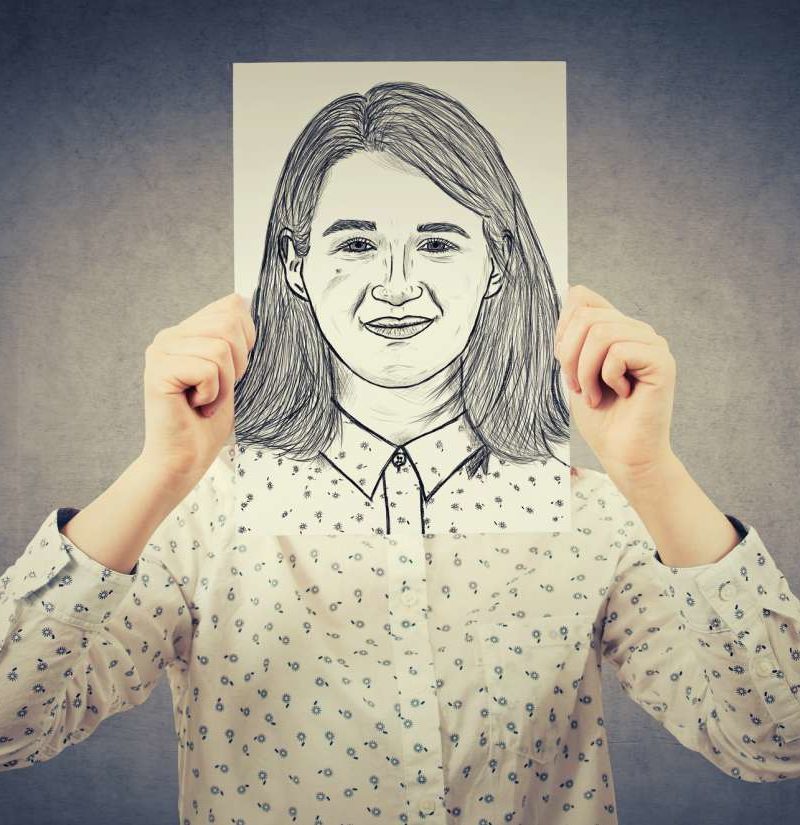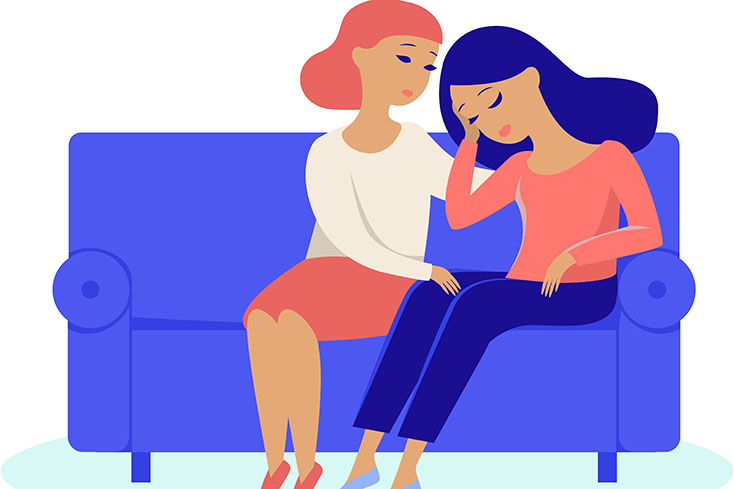Reduced affect display is a cognitive disorder that affects how a person perceives and reacts to stimuli. This can lead to problems with social interactions, work, and daily activities. People with reduced affect display may appear emotionless or uninterested in the world around them. In this blog post, we will discuss what reduced affect display is, its symptoms, and how to deal with it.
Contents
- 1 What Is Reduced Affect Display?
- 2 Types of Reduced Affect Display
- 3 Signs And Symptoms of Reduced Affect Display
- 4 Reasons for Reduced Affect Display
- 5 Negative Impacts of Reduced Affect Display
- 6 Dealing With Reduced Affect Display
- 7 Helping Someone With Reduced Affect Display
- 8 Conclusion
- 9 A Word From Therapy Mantra
What Is Reduced Affect Display?
 Reduced affect display is a condition in which a person experiences reduced emotions. This can make it difficult to interact with others, as the person may not be able to express their feelings or understand the feelings of others.
Reduced affect display is a condition in which a person experiences reduced emotions. This can make it difficult to interact with others, as the person may not be able to express their feelings or understand the feelings of others.
People with reduced affect display may also have difficulty regulating their emotions, which can lead to problems such as anger outbursts or depression. It is important to seek help if you think you or someone you know has reduced affect display, as there are treatments available that can help manage the condition.
Types of Reduced Affect Display

There are many types of reduced affect display, but some of the most common ones are:
Constricted Affect
The constricted effect is when a person has a very limited range of emotions and shows little to no emotion in social situations. People with constricted effects may seem uninterested in others, or even bored. The most common symptoms are a lack of facial expressions, reduced vocal inflection, and few gestures.
Detached Affect
The detached effect is when a person seems to be emotionally removed from their surroundings. They may not react to good or bad news, and they may not show much interest in other people. The detached effect is often mistaken for apathy, but the two are different. People with detached affect still care about others, they just don’t feel the same level of emotion as most people do.
Inhibited Affect
The inhibited effect is when a person has a very strong reaction to emotions, both positive and negative. They may have trouble showing any emotion at all outside of these strong reactions. People with inhibited effects may seem shy or unapproachable. They may also have a hard time dealing with their emotions, which can lead to problems like anxiety or depression.
Masked Affect
A masked effect is when a person hides their emotions behind a fake persona. They might seem happy and bubbly on the outside, but inside they’re feeling angry, sad, or scared. People with masked effects often feel like they have to put up a front in order to fit in or be accepted by others.
Flat And Blunted Affect
A flat and blunted effect means a reduced intensity in emotional expression, feeling, or communication. This is also a reduced range of emotion. This also gives a reduced response to stimulation.
Signs And Symptoms of Reduced Affect Display

The signs of reduced affect display can be difficult to spot, as the individual may try to mask their emotions. Some of the common signs and symptoms include:
Limited Facial Expressions
There are typically reduced facial expressions, such as a lack of smiling or eye contact. There are also many cases where reduced affect individuals will not blink as often as others, which can make them appear to be staring or uninterested. Sometimes there are also reduced movements in general, which can make the individual seem stiff or robotic.
Monotone Voice
Reduced affect individuals often speak in a monotone voice, lacking any emotion or fluctuation. This can be especially noticeable when they are speaking about something that is emotional or personal to them. There are also cases where reduced affect individuals will mumble or speak quietly so that others have to strain to hear them.
Lack of Interest in Activities
Individuals with reduced effect often lose interest in activities that they used to enjoy. This could be anything from hobbies to socializing with friends. They may also seem apathetic or uninterested in what is going on around them. There are also many things that reduced affect individuals may no longer find pleasurable, such as food, sex, or even activities that used to bring them joy.
Inability to Connect Emotionally
Reduced affect individuals have a difficult time connecting emotionally with others. They may not feel empathy or sympathy and instead just feel numb towards other people’s emotions. This can make it difficult for them to form meaningful relationships, as they struggle to understand the other person’s perspective. There may be also a lack of interest in discussing personal topics or feelings.
Limited Gesturing
Reduced affect individuals will often have reduced gesturing as well. This could mean that they have reduced hand movement, arm movement, or head movement. Often times they will keep their hands and arms close to their body, not displaying much movement at all. There are also reduced affect individuals who will rock back and forth or fidget with objects, as a way to self-soothe or calm down.
Emotional Flatness
Individuals with reduced affect display may have a reduced emotional range and seem emotionally flat. They may not show much excitement, happiness, or sadness, and may instead seem emotionless or robotic. There are also reduced affect individuals who will cry more easily, as they are not able to regulate their emotions as well.
Inability to React Appropriately
Individuals with reduced affect display may have a difficult time reacting appropriately to emotions, whether their own or others. They may not be able to show empathy or understand what someone else is feeling. There are also reduced affect individuals who will laugh or smile inappropriately, as they do not understand when something is actually funny. This can be very confusing and off-putting for others.
No-Eye Contact
When you want to know how a person with reduced effect is doing, you should look into their eyes. Reduced affect individuals typically will not make eye contact, or if they do it will be for a very short time. This can be interpreted as a lack of interest or disinterest in the other person. There are also cases where reduced affect individuals will avoid looking at anyone as if they are ashamed or embarrassed.
Reasons for Reduced Affect Display

There are many reasons for reduced affect display. Some of these are:
Personality Issues
One of the main reasons for reduced affect display is personality issues. People who have low self-esteem or are insecure often don’t want to show their emotions because they feel like they might be judged by others. This can lead to them appearing cold and unemotional to the people around them. There can also be a fear of appearing weak or being taken advantage of.
Trauma
People who have experienced a traumatic event can often show reduced affect display. This is because they may feel like they are not in control of their emotions and that showing any emotion will make them vulnerable. They may also feel like they are not allowed to express their feelings because it is too painful.
Depression
Depression can also cause reduced affect display. This is because people who are depressed often feel like they have no reason to be happy and that there is no point in trying to show any emotion. They may also feel like they are a burden to others and that it is better not to show any emotion at all. There are also many things that one can do to help cope with reduced affect display.
Genetics
Genetics is another factor that can play a role in reduced affect display. Some people may be more prone to this type of behavior because it is something that is passed down from their parents. There are also many things that one can do to help cope with reduced affect display. Sometimes, however, reduced affect display may be a sign of a more serious problem and should be addressed by a professional.
Environmental Factors
Some environmental factors can also lead to reduced affect display. This includes things like growing up in a dysfunctional family or being raised in an abusive home. These types of environments can often cause people to feel like they are not safe showing their emotions. There are also many things that one can do to help cope with reduced affect display.
Medications
Sometimes there maybe be a medical reason for reduced affect display. This is often the case when people are taking medications that affect their mood. If reduced affect display is new behavior or it is accompanied by other troubling symptoms, it is important to speak with a doctor. Some of the medications that can cause reduced affect display are:
– Anti-depressants
– Anti-psychotics
– Lithium
There are many things that one can do to help cope with reduced affect display.
Negative Impacts of Reduced Affect Display

There are many negative impacts of reduced affect display. Some of these impacts include the following:
Reduced Communication
One of the main impacts of reduced affect display is that it can reduce communication. When someone is not displaying their emotions, it can be difficult for others to understand what they are feeling and how they are reacting. This can make it difficult to build relationships and communicate effectively. There are also reduced chances of connection and empathy.
Reduced Social Interaction
reduced social interaction is another common impact of reduced affect display. People who do not express their emotions tend to withdraw from social situations, which can lead to loneliness and isolation. This can also have a negative impact on mental health.
Emotional Suppression
When someone does not express their emotions, it can lead to emotional suppression. This means that the person’s emotions are bottled up and they are not allowed to release them. This can lead to a lot of negative feelings such as anger, frustration, and sadness. These emotions can often be expressed in unhealthy ways, such as through violence or substance abuse.
Reduced Engagement
Another impact of reduced affect display is that it can lead to reduced engagement. When someone is not expressive, it can be difficult for them to get involved in activities or tasks. This can lead to a feeling of detachment and boredom. Sometimes there are also reduced chances of success, as people who are not expressive may have difficulty taking risks.
Schizophrenia
Schizoaffective disorder is a mental illness that is characterized by reduced affect display. People with this disorder often do not express their emotions, which can lead to social isolation and emotional suppression. This can also lead to problems with communication and relationships. It can also be difficult for people with this disorder to engage in activities and tasks.
Dealing With Reduced Affect Display

There are many ways to deal with reduced affect display. These are some of the ways to deal with reduced affect display. Some of these are:
Talk To Someone
Talking with someone always helps. Especially if it is someone you trust. Talking to a therapist might be a good idea. There are also some things that you should always talk about it as it might help. When you want to talk about reduced affect display, there are some points that you might want to consider.
Express Yourself In Other Ways
If you do not feel comfortable talking, you can express yourself in other ways. You can write down your thoughts or draw pictures. This is a good way to release your emotions and it can also be helpful for others to understand what you are feeling.
Be Patient
Reduced affect display can take some time to get used to. It is important to be patient and understand that it will take time for the person to open up. Do not push yourself too much to express yourself and give yourself time.
Seek Professional Help
If the reduced affect display is causing problems in your life, it might be a good idea to seek professional help. There are many professionals who can help you deal with this issue. You can talk to your doctor or find a therapist who can help you manage this problem. There are many people who suffer from reduced affect display and there is help available. Sometimes there are also things like medication that can help.
Take Care of Yourself
You should always take care of yourself. This means eating healthy, exercising, and getting enough sleep. When you are taking care of yourself, it is easier to deal with reduced affect display. You will feel better and be able to manage your emotions better. Sometimes there are also supplements or vitamins that can help. reduced social interaction is another common impact of reduced affect display. People who do not express their emotions tend to withdraw from social situations, which can lead to loneliness and isolation. This can also have a negative impact on mental health.
Helping Someone With Reduced Affect Display

Helping someone with reduced affect display can be difficult, but there are ways to make it easier. Here are a few tips:
Be Patient And Understanding
Being Patient is very important for someone who wants to help someone with reduced affect display. Remember that they are not doing this on purpose and they may not be able to control their emotions. There are also things like anxiety and depression that can make reduced affect display worse, so be understanding of that as well.
Be Supportive
When someone is dealing with reduced affect display, they may feel like they are alone or that no one understands them. It is important to be there for them and show them that you care. You can do this by listening to them, providing emotional support, and being there for them when they need you.
Encourage Them To Seek Help
If reduced affect display is causing the person a lot of distress or if it is impacting their life in a negative way, encourage them to seek help from a professional. There are therapies and treatments that can help reduce the symptoms of reduced affect display.
Talk In A Calm And Gentle Voice
When talking to someone with reduced affect display, try to use a calm voice. Yelling or being too loud will only make them feel worse and could cause them to lash out. There are also things like sensory overload that can make reduced affect display worse, so be aware of that.
Be Aware Of Sensory Overload
When someone is experiencing reduced affect display, they may be more sensitive to noise, light, and touch. Be aware of this and try to avoid being too loud or overwhelming them with stimuli. If you are in a public place, try to find a quiet corner where the person can relax.
Don’t Take Things Personally
When someone is dealing with reduced affect display, they may say things that seem mean or harsh. Remember that this is not meant to hurt you and take things in stride. If you can’t handle the way the person is acting, it is best to remove yourself from the situation. There are also things like online support groups that can provide you with emotional support.
Try To Avoid Triggering Situations
If there are certain things that trigger reduced affect display in the person, try to avoid those situations. This may be difficult, but it is important to do what you can to make the person feel comfortable. If you can’t avoid a triggering situation, try to prepare the person for it and explain why you are going into it.
Conclusion
Reduced affect display can be very difficult to deal with, but there are ways to cope. First, it’s important to understand what reduced affect display is and what causes it. Once you have a better understanding of the condition, you can start working on coping strategies.
Some people with reduced affect display may find it helpful to talk to a therapist or counselor. Others may find that talking to friends or family members helps them feel better. It’s also important to find healthy ways to cope with stress and negative emotions. Exercise, meditation, and relaxation techniques can all be helpful in managing reduced affect display. It’s also important to remember that reduced affect display is not a sign of weakness or something that should be ashamed of. You are not alone in this condition, and there are people who can help you manage it.
A Word From Therapy Mantra
Your mental health — Your psychological, emotional, and social well-being — has an impact on every aspect of your life. Positive mental health essentially allows you to effectively deal with life’s everyday challenges.
At TherapyMantra, we have a team of therapists who provide affordable online therapy to assist you with issues such as depression, anxiety, stress, workplace Issues, addiction, relationship, OCD, LGBTQ, and PTSD. You can book a free therapy or download our free Android or iOS app.


